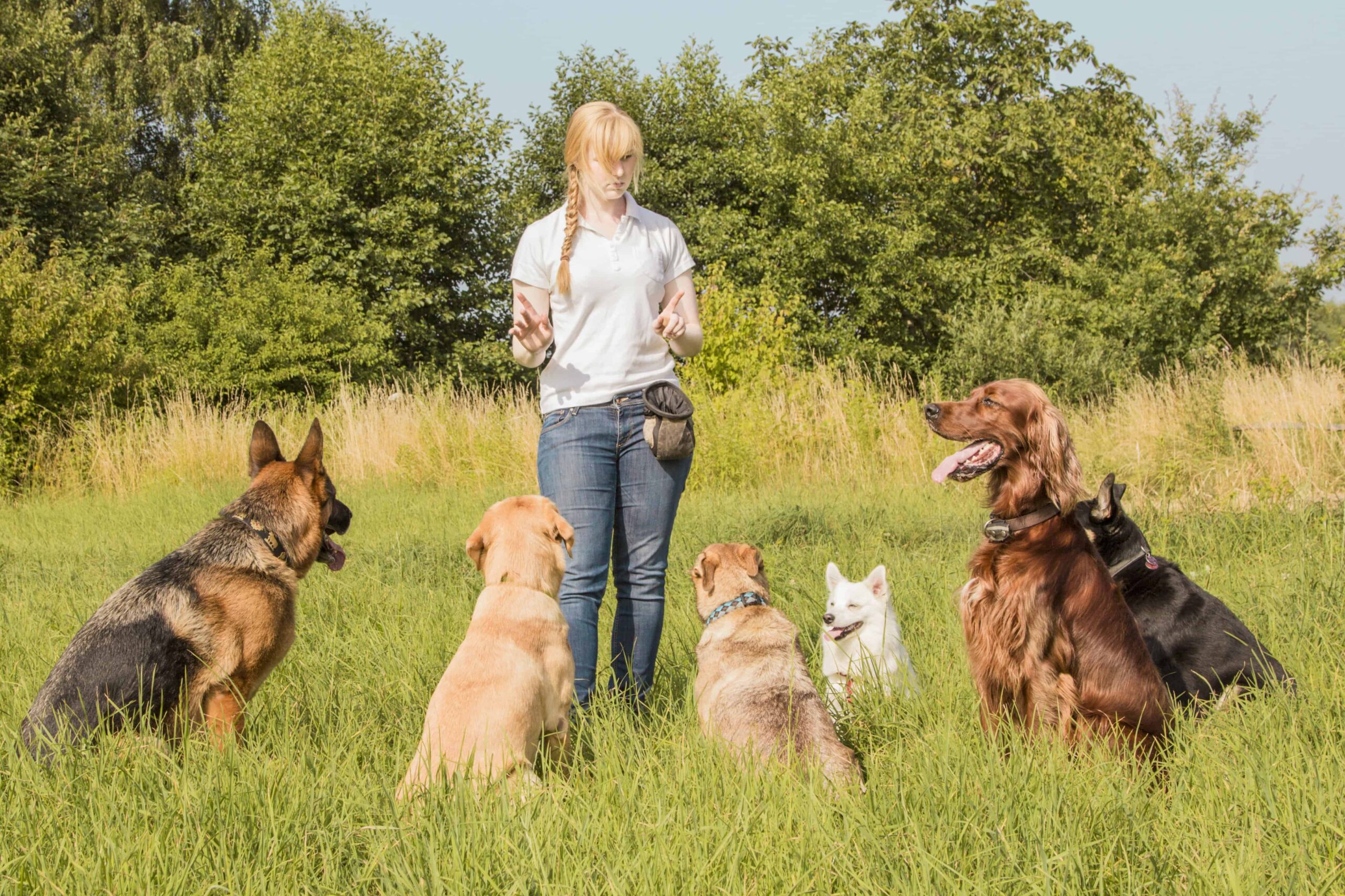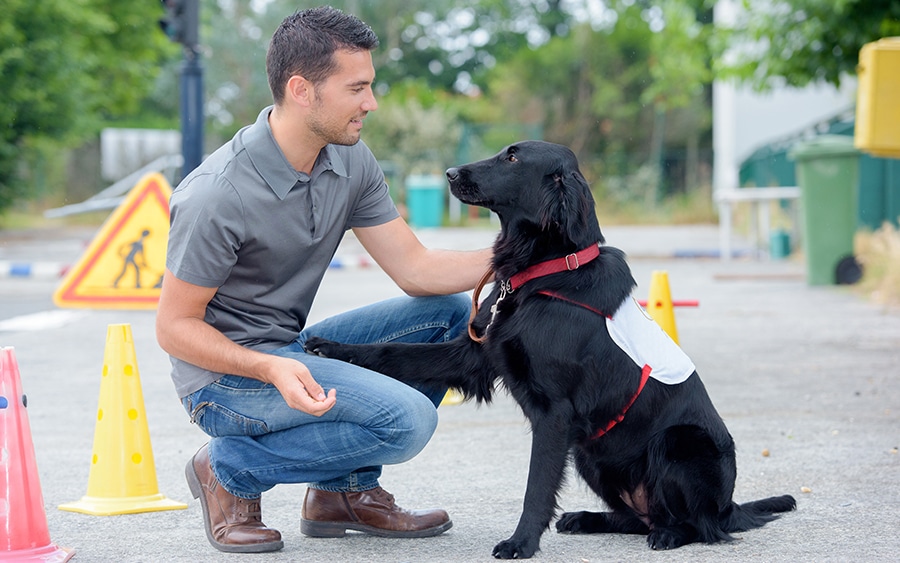Unlock Your Pet's Potential: Proven Canine Training Techniques for Success
Efficient dog training is a nuanced procedure that hinges on understanding canine behavior and using clinically backed techniques. By including favorable reinforcement, developing clear commands, and prioritizing socializing, canine proprietors can cultivate an efficient partnership with their family pets.
Understanding Pet Behavior
Recognizing canine behavior is necessary for efficient training and cultivating a positive partnership between pets and their proprietors. A comprehensive understanding of canine body language, articulations, and social communications is important for recognizing their emotions and demands. Canines connect mainly via non-verbal cues; for instance, a wagging tail might indicate exhilaration, while pinned ears can signal anxiety or entry.

Furthermore, environmental elements play a considerable function in shaping a canine's behavior. Changes in regular, brand-new environments, or the existence of unfamiliar individuals can result in stress and anxiety or anxiety in pet dogs. Identifying these triggers makes it possible for owners to reduce unfavorable reactions and create ideal training methods.
Inevitably, a deep understanding of pet dog habits lays the foundation for effective training techniques, improving both behavior and the total bond between the canine and its owner. dog training charlotte nc. This understanding is vital for promoting a well-adjusted, happy canine friend
Positive Support Methods
Effective training relies greatly on positive support methods, which have actually been revealed to yield substantial lead to shaping wanted habits in pets. This technique involves compensating a canine for showing certain behaviors, therefore boosting the possibility that these actions will be repeated. Benefits can take numerous types, consisting of treats, appreciation, toys, or play, depending on what encourages the individual pet dog.

It is vital to progressively eliminate benefits as the dog finds out the actions, transitioning to periodic reinforcement. This strategy keeps the habits in time while preventing dependence on continuous rewards. By concentrating on positive support, instructors can cultivate a trusting partnership with their canines, advertising a healthy and balanced and cooperative training setting that boosts overall obedience and efficiency.
Establishing Regular Commands
A basic aspect of effective canine training is the facility of constant commands. Uniformity in commands is crucial for reliable communication in between the fitness instructor and the dog. When commands are consistent, canines learn to connect particular words with wanted behaviors, which increases the training process and boosts understanding.
To establish constant commands, it is important that all member of the family utilize the very same terminology and motions. If one individual uses "rest" while an additional says "rest down," it can develop confusion for the canine. Select clear, distinctive words for commands and ensure everybody involved in the canine's training sticks to these choices.
Strengthen commands with constant technique, making certain that the dog receives ample opportunities to respond correctly. When a canine effectively complies with a command, immediate positive reinforcement should follow.
Lastly, hold your horses. Establishing consistent commands takes some time and initiative. With commitment and clearness, you will help your dog develop a solid understanding of assumptions, inevitably leading to a well-behaved friend.
Socializing and Direct Exposure
Mingling a pet is essential for fostering a well-adjusted and certain buddy. This process involves revealing your pet dog to a range of atmospheres, people, and various other pets to develop their social abilities and flexibility. Early socializing, ideally in between the ages of three to fourteen weeks, is important, as it prepares for a pet dog's future habits.
Throughout socializing, objective to give favorable experiences in different setups, such as parks, active streets, and homes with other pet dogs. Present your pet dog to different stimulations, including audios, sights, and smells, ensuring that each experience is gratifying. This direct exposure assists reduce fear and anxiousness, paving the means for a more resistant canine.
Participating in controlled team play sessions with other canines can likewise enhance social abilities, teaching your family pet suitable communications and limits. Always monitor your pet's convenience degree throughout these experiences, gradually raising exposure as their self-confidence grows. Keep in mind, the objective is to create an all-around pet dog that prospers in rattlesnake avoidance training near me varied circumstances, promoting a harmonious partnership right here with both humans and other pets. Focusing on socializing will considerably add to your pet's general joy and habits throughout their life.
Overcoming Common Educating Obstacles

An additional regular concern is diversion. Pets may battle to focus in strange or busy setups. Progressively desensitize your canine to interruptions by beginning training in a quiet atmosphere and gradually presenting even more stimuli as they come to be competent (dog training near me). Favorable support techniques, such as deals with and appreciation, can maintain motivation and emphasis.
Furthermore, behavior concerns like leaping or excessive barking can become discouraging. Address these by educating alternative habits, such as sitting comfortably when greeting guests. Uniformity and patience are important; enhance wanted actions consistently and avoid scolding, which can result in complication.
Last but not least, identify that each dog is unique, and training timelines may differ. Tailor your strategy to your pet's specific needs, and seek specialist guidance if necessary. With perseverance and the right strategies, overcoming these challenges can lead to a well-trained, happy canine companion.
Conclusion
Finally, unlocking a dog's possible demands a comprehensive strategy that includes an understanding of canine habits, the application of positive reinforcement techniques, and the facility of constant commands. Early socialization and direct exposure to varied atmospheres even my explanation more enhance a canine's adaptability and self-confidence. By attending to typical training challenges with customized approaches and perseverance, a unified and participating partnership in between dog and trainer can be cultivated, eventually leading to a mannerly buddy efficient in thriving in numerous circumstances.
Effective pet dog training is a nuanced process that pivots on comprehending canine actions and utilizing scientifically backed methods.Understanding pet dog behavior is important for effective training and promoting a favorable connection in between canines and their proprietors.Effective training counts heavily on favorable support methods, which have actually been shown to produce significant results in shaping wanted habits in pets. When commands are uniform, pet dogs learn to connect details words with desired actions, which increases the training process and improves understanding.
In conclusion, unlocking a canine's prospective demands an extensive technique that includes an understanding of canine habits, the application of favorable reinforcement methods, and the facility of regular commands.